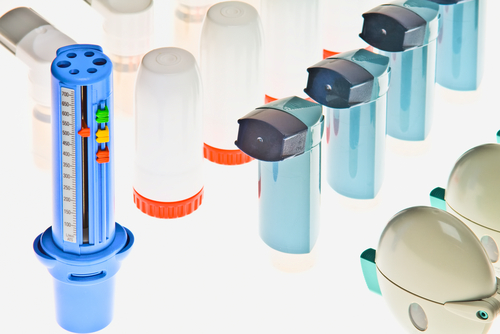Study of GSK’s COPD Combination Therapy Relvar Ellipta Shows Positive Results

GlaxoSmithKline (GSK) recently presented data showing that its combination drug Relvar Ellipta (fluticasone furoate and vilanterol) causes a statistically significant reduction in the rate of severe lung exacerbations in patients in the Salford Lung Study (SLS), which assessed the safety and effectiveness of the drug in patients with chronic obstructive pulmonary disease (COPD).
Study results were published in The New England Journal of Medicine (NEJM) and presented at the European Respiratory Society (ERS) International Congress on Sept. 4 in London (abstract number OA249).
The study, “Effectiveness of Fluticasone Furoate–Vilanterol for COPD in Clinical Practice,” evaluated the safety and effectiveness of the once-daily inhaled drug combination in 2,802 COPD patients enrolled in a standard clinical environment. Patients were randomized into the following treatment groups:
- Patients who received the combination therapy of Relvar Ellipta, administered once daily as a dry powder through an inhaler. Those in this group who had been previously treated with two long-acting bronchodilators and an inhaled glucocorticoid were allowed to continue medication with the long-acting muscarinic antagonist in addition to the assigned treatment option.
- Patients who continued their usual care as determined by their general practitioner (the usual-care group).
The primary and secondary outcome measures of the study (NCT01551758) were based on the patients’ FEV1, which is a measure of lung function defined as the maximal amount of air that can be forcefully exhaled in one second. The researchers assessed both the FEV1 change from the beginning of the study to day 85, and the change in average post-dose FEV1 from the beginning of the study to day 84.
Safety measures were analyzed based on the study’s adverse event (SAE) data.
The results revealed that:
- Patients who had a history of lung exacerbations in the year prior to the study and were in the Relvar Ellipta group showed a statistically significant reduction in exacerbations when compared to the usual care group;
- Patients in the Relvar Ellipta group using an inhaled corticosteroid (ICS)/long-acting beta2-agonist (LABA) at the beginning of the study showed a similar reduction in lung exacerbations;
- No differences were observed between Relvar Ellipta and usual care on secondary outcomes measured;
- The COPD Assessment Test (CAT), a measure of the impact of disease on health status, showed that 45 percent of patients receiving Relvar Ellipta improved their CAT score by 2 or more, a clinically relevant improvement, compared to 36 percent in the usual care group;
- The rate of observed SAEs was similar in all treatment arms.
“In the SLS study we included a broad spectrum of patients who had minimal interventions to see if this would allow us to observe a difference between treatments. The results from SLS provide robust evidence that will enable the healthcare community to begin to understand how the choice of COPD treatment can significantly influence patient outcomes,” Neil Barnes, the Global Medical Head for the Respiratory Franchise at GSK, said in a press release.
“We are continuing to analyze the data from the study as we know there is so much more we will learn and we look forward to sharing our findings in future publications,” he said, and thanked everyonewho took part in the study.
Michael W. Aguiar, president and CEO of Innoviva, the industry partner of GSK in the study, added that “the data being presented at ERS and published in NEJM confirm the effectiveness of Relvar Ellipta compared with not only usual care, but also with those patients who were taking a different medicine in the same [drug] class. These are important data to share with physicians, from a unique study carried out in conditions closely reflecting everyday clinical practice.”
Results from a second SLS study, assessing this treatment combination in patients with asthma, are expected to be released in early 2017.





